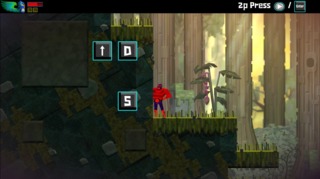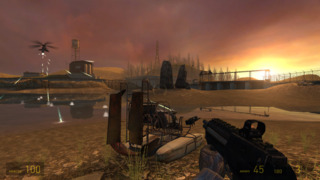How A "Skip Gameplay" Button Could Hurt Casual Players
By gamer_152 15 Comments
Note: The following article contains major spoilers for Inside and minor spoilers for Hotline Miami and Deus Ex: Mankind Divided.

The difficulty of video games reduces their accessibility relative to other forms of media. This keeps coming up, and sometimes we act like it comes up because of the way a single game handles difficulty or because of the comments of an individual developer, but there's more to it than that. The audience for computer games has ballooned in the last couple of decades, the industry wants the higher profits that come with more consumers, and there's a lot of meaning to be found in any medium being able to speak to a range of people. These factors contribute to the way games are made and talked about, and they're why the accessibility discussion is so sticky. As long as these don't facts change (and they won't anytime soon), the issue of whether or how we could move past difficulty barriers to welcome more people into games remains prescient. We should get used to treating this discussion as not just recurring, but ongoing because the factors behind it are constants.
Assassin's Creeds: Origins provides us with one of the most straightforward answers for how we might open the gate of games wider: If gameplay is proving too challenging for people then take gameplay out of games and just let casual players explore. It's a valid approach and one that I'd like to see used more liberally, but all the same, this isn't opening gameplay up to a larger audience, it's removing gameplay. If we want more people to experience the magic of games where "games" means media with mechanics, rules, goals, progression, wins, and losses then we need another solution.

We also have to keep in mind that Origins was only able to add its Discovery Tour mode because it has a certain type of world: a detailed, expansive, educational, and open one. A dedicated exploration mode wouldn't work nearly as well in a smaller or more linear game, and plenty of games use settings for which a virtual tour wouldn't carry the same appeal for a mainstream audience. It's logical to think about games like Assassin's Creed and consider removing play as a way to get more hands on controllers, but imagine trying to implement a discovery tour in a game like Donkey Kong or Max Payne. Ubisoft's accessibility solution isn't so much a method for breaking down the walls around video games as it is a method for breaking down the walls around one type of game.
If we want to make gameplay itself approachable, then we need another fix, and the most straightforward to enact would be a "skip gameplay" button, a feature that's been the subject of at least modest chatter. Bioware writer Jennifer Hepler proposed this idea back in 2006, Rock, Paper, Shotgun's John Walker has written three different articles on the subject, developer Max Battcher had a blog on it featured in Kotaku, and a Gamasutra talk in May 2017 touched on the possibility. This is not to mention the scattered debates on the feature that have popped up in public forums. Granted, most of these discussions are about being able to skip combat rather than being able to skip any gameplay, but the arguments that the above articles make can be applied across the board and could as easily be about a "skip platforming" or "skip driving" button.

While the concept of a switch that catapults audiences past troublesome play is well-meaning, I don't think it's the holy grail of player accessibility. More than that, I believe that in many scenarios it has the opportunity to lock casual players out of essential experiences in games or even to amplify existing problems inexperienced players find with games. I'm not coming at this from the perspective that high difficulty is for everyone and that if we just forced the casuals to buckle down and grit their teeth, they'd sharpen their skills and emerge with the spark of victory in their veins. I think approaching people less invested in the medium this way is more likely to make them put down games and turn to entertainment that will immediately reward them than it is to make them struggle their way towards fun. However, if we're talking about difficulty then let's talk about difficulty curves.
Say we have a hypothetical player and a hypothetical video game. Our player is not very experienced, and they keep dying on the final level of the first world, so they tap "skip" and are teleported straight to World 2. The game might ease up on them for a little while, but if they couldn't complete the last level of World 1, it's logical that they will get stuck even sooner in World 2 and the urge to skip levels will rear its head even earlier this time. Unless the player's skill improves, which it won't if they keep bounding ahead through the game whenever they get stuck, they will soon hit a wall where none of the levels are easy enough for them to play.
This is the biggest problem with a "skip gameplay" button, at least, one that the player can apply without restraint. Difficulty isn't something that arrives sporadically throughout games; it ramps up section by section. Creators construct games in a way that trusts players can deal with these upward slopes through practice; the kind of practice that they are deprived of by a "skip" button. So skipping a section for being too tough doesn't alleviate the problem of difficulty, it just pushes it further into the future and ensures that the next time the problem comes up, it will be even more severe. The player can easily create a feedback loop where they skip sections because they're too hard and can't face hard sections because they keep skipping them. Every time the "skip" button is pressed the problem compounds, and a casual player likely won't realise that they're setting this trap for themselves.
My example of a video game here is a little idealised. After all, a lot of games have sudden difficulty spikes which don't represent the conditions of the surrounding content. For these sections, a "skip" button could unstick the player without depriving them of vital practice. We must also keep in mind that there are other reasons a player might skip a section apart from it being too hard. It's easy for someone to pick up a game and find that some of its gameplay puts a smile on their face and that some of it makes them want to eat broken glass. Plenty of games have their equivalent of the water level that we all wish we could fast-forward through, and for those instances, a "skip" button could provide welcome relief. None the less, the feature has very limited potential to help casual players when they feel they're in over their head and may dig them deeper into their difficulty hole. Even when design is shoddy, casual players would be better served by developers taking more time to smooth out difficulty curves or to generally punch up the design than they would be by a "skip" button.

Of course, practising strategy and control is only one part of players developing their skills. The other part is them learning new mechanics. A common myth of game design is that players are taught mechanics in a tutorial at the start of the game and that that's all the mentoring a game gives them before shoving them out into their big, wide world. It's true that developers often frontload games with information, but openings are not the only sections used to teach players, and player education in intros tends to be the most noticeable because it's the most explicit.
An engaging game will introduce, for example, new enemies, environmental objects, and items for the bulk of its runtime but will do this mostly by setting them down in front of the player and letting them experiment with the new concepts to figure them out. If a player skips one of these soft tutorials, then they bypass the best chance they have of learning how to use specific guns or fight certain enemies. This needn't be a game-breaking mistake, opportunities to learn will still come back around, but games tend to introduce new ideas in an environment where players can safely feel them out and then ramp up the difficulty, assuming the player has gotten the hang of the mechanics. As a consequence, learning about new concepts a while after they've been introduced is often harder than trying to internalise them the first time around, and a "skip" button could have players unwittingly miss that first time.

Remember that tutorial design is a work in progress and that the road to improvement likely lies in more games bleeding their tutorial elements into the game as a whole as Half-Life 2 does. If more games start doing this, it's going to become harder to fit a "skip" feature into them. More of the game becoming tutorial means less of the game is safely skippable, and if we talk about puzzle games specifically the picture gets even grimmer. In a properly thought-out puzzle title, even unremarkable levels often teach us patterns and interactions between gameplay mechanics which we must reuse in coming levels. Start thinking about letting the player delete puzzles at-will in a game like Portal or The Witness, and it becomes obvious the potential the "skip gameplay" button has to make games even more confusing to navigate.
We've discussed the problems with skipping as it relates to gameplay but what about as it relates to narrative? One of the most common arguments for a "skip gameplay" lever is that we need it because some people want to skip past the gameplay to get to the story, but these lines between gameplay and story are ghostly thin or non-existent in some games. It's fine to suggest that someone might skip combat in Mass Effect to chuck out all the chest-high walls and get straight to the scenes of aliens discovering themselves and others amongst the infinite cathedral of the stars. However, I'd argue that combat in Mass Effect and some other story-heavy games is so disposable because of those games' failure to integrate gameplay and narrative properly. I'm also in the camp that video games being able to convey their stories and themes in a more impacting way is going to involve gameplay becoming expressive of those stories and themes. A lot of games already do express themselves in this way.

Take the end of Inside. Inside is, for its first two acts, a lonely odyssey in which you parasitically mind-control other characters to solve puzzles. In the game's third act twist, you are absorbed into a fusion of human beings called "The Huddle" which is unwieldy to control but can move objects about and break through walls in a way no individual could. The moral is that working together can be awkward, but that we are stronger when we co-operate with each other than when we manipulate each other. Inside has almost no text or spoken word; its visuals and gameplay are its voice. Hence, if the player skips through the "Huddle" section to the ending, the message of Inside is lost. There are countless examples like this where players would neuter stories and themes by skipping past the play that reinforces them.
Think about how the hospital level in Hotline Miami can be discouraging because you have no defence against enemies, but that this difficulty and the vulnerability the protagonist feels after their accident are one and the same. Near the end of Deus Ex: Mankind Divided players sneak past a police force which has locked down Prague. Again, the challenge involved might cause your tolerance to run dry, but that challenge is an expression of the oppression you would feel if police locked down the streets of your city. Then there are horror titles where the play of avoiding the monster instils in us some of the terror that the protagonist feels in their current peril. You can probably think of many more examples like this, but the point is that in a lot of interactive entertainment, you cannot take a pass on the play without taking a pass on the story. In some games, there's no reason why the player shouldn't be able to experience the narrative as a standalone feature. However, there are plenty of examples where demanding that players have a means to skip past the gameplay to get to the story would be like looking at a film and demanding that the viewer have a means to skip past the cinematography to get to the action scenes. It's not a request that makes sense.
If you go by Walker's articles for Rock, Paper, Shotgun, even all of my objections put together aren't an argument to not have a "skip" button. Walker observes that other media like books and films let you skip through them and that even if that ruins them or is a stupid decision on the part of the audience, that it's the right of the person who bought those products to be able to use them how they want. I basically agree, but still, if skipping through your chosen piece of media ruins it, it would be beneficial for both creators and target audiences to know that beforehand and to consider alternatives. The temptation of implementing and using a "skip gameplay" button is in thinking about games as a reel of isolated, non-sequitur scenes, but the reality is that, as with any media, the individual chunks of video games affect the whole work. You can't remove or alter one scene without changing your experiences of all the scenes.
This is not to say that the "skip gameplay" switch wouldn't have some utility, but brute force "fix problem" buttons don't unequivocally solve long-running, deep-rooted problems in complex systems. If there are exact answers for how we might reconcile difficulty with accessibility then they're elusive, but in the above examples casual players would be better served by superior game balancing, more options to make games easier, or better player instruction than they would be by just being given a curtain of content and a pair of scissors. It's likely the case that if more people want to participate in video games, then the answer is not going to be engineering ways we can deprive them of gameplay but working on ways that we can involve them in gameplay. Thanks for reading.